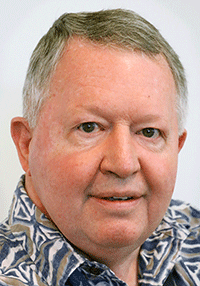
Elder Michael Theobald
Elder Michael and Sister Shauna Theobald have recently completed 13 months as senior training missionaries at the Polynesian Cultural Center and returned to their home in Orem, Utah.
While volunteering here this time, they conducted leadership training for full-time staff and helped with orientation for new PCC employees. He had also previously conducted management training at the Center on eight other occasions.
A worldwide trainer
It’s an understatement to say that Elder Theobald is a highly skilled trainer. He graduated from BYU in 1976 with a master’s degree in the relatively new discipline of organizational behavior. “While there, I had the opportunity to be Steven R. Covey’s graduate assistant when he was writing The Seven Habits of Highly Effective People,” he said.
He then spent 36 years working in that field — the last 28 of them at headquarters for The Church of Jesus Christ of Latter-day Saints. For 13 years during that time he was the worldwide Director of Organizational Development and Leadership Training. He reported to the Managing Director of Human Resources, who reported directly to the Latter-day Saint First Presidency and the church’s human resources committee, and he logged more than a half-million air-miles in carrying out his duties.
As part of his training duties for the full-time people at PCC, Elder Theobald customized and taught the Franklin-Covey “Four Roles of Leadership”:
Pathfinding— “including the mission statement, purpose, values, vision and strategy”; Alignment — “making sure that PCC processes are in alignment, organizational ‘silos’ are eliminated and what we value is actually happening”; Empowering — “to utilize all of the skills, talents and abilities of people”; and Modeling, including “how to lead like the Savior and be better classroom facilitators, not just lecturers.”
“One of the main expectations of the training is that the full-time staff at the PCC will then mentor and train the hundreds of part-time student employees on the job at any given time. We’ve had a lot of really good success,” he said.
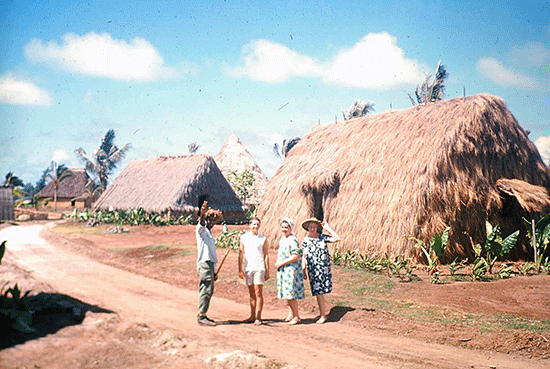
14-year-old Michael Theobald (in white shirt), his mother, grandmother and a Fijian friend in the Hawaiian Village, 1963. (Historical photos courtesy of Elder Theobald)
The summer of 1963
Unlike many of their senior missionary colleagues and predecessors at the PCC, however, Elder Theobald’s voluntary service began in the summer of 1963, a few months before the Center opened. Here’s what happened:
“I was 14 years old, and that was the first time I came to Hawaii,” Elder Theobald recalled. He explained that after his uncle had accepted a banking job in Honolulu, he invited him, his mother and grandparents to spend the summer here with his family.
“We lived in a house right across the street from the PCC. All the Polynesian kids from the teacher’s quorum at church would come and get me every morning and either take me swimming or hiking in the mountains. In the afternoon, we’d go over and help build the PCC.”
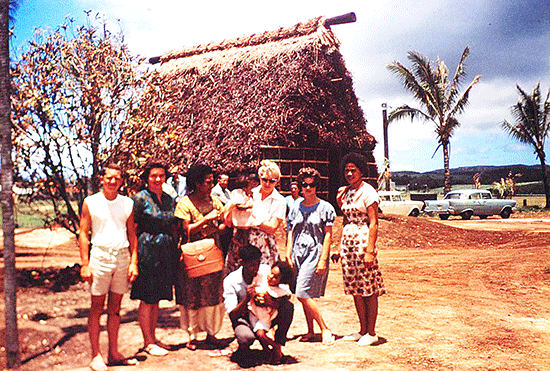
Theobald with family and friends at the Fijian Village when it was still under construction.
The Polynesian Cultural Center nears completion
“We would haul rocks, plants and whatever else they could get a bunch of 14-year-old kids to do,” Elder Theobald continued. “That was near the end of the building phase of the Center, which opened in October that year.”
“In those days the Center was still pretty barren. There was still a lot of dirt work to do and not many plants yet. The huts had been built by the labor missionaries, but the lagoon hadn’t been filled in yet. It was all pretty basic.”
Changes at the PCC over the years
After that memorable summer of his youth, Elder Theobald said he next came to Hawaii, this time with his wife, in the mid-1980s. “I was amazed at how green everything at the Polynesian Cultural Center was,” he said. “The lushness was just amazing, and it has just kept getting better ever since. This is an amazing place.”
Elder Theobald said even his mother and father, Paul and Dorothy Theobald who served as senior missionaries here in 1993-94, have contributed their time and talent to the changes.
“There was need for a backhoe operator at that time, and my dad was a general contractor with his own backhoe,” he said. “The church purchased that and shipped it over. My dad ended up doing everything from sewer work, piping, and working on the farm to burying a shark that washed up on the beach. He often worked 10-to-12-hour days.”
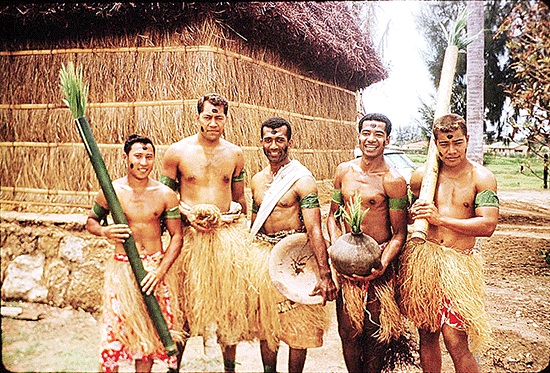
Future Fijian villagers prepare for the Polynesian Cultural Center’s opening in 1963.
Some things are still the same
“The aloha spirit of the people is still the same here,” Elder Theobald said. “It’s still here.
“My roots go pretty deep at PCC, ever since those kids and I did all those things together in ‘63. I was pretty amazed that they would pay attention to a visiting haole [Caucasian] kid,” he continued, “and then they threw a big luau for us before we left.”
“I’m excited about the students who come to BYU–Hawaii today, and those who come under the I-WORK [work-study financial assistance] program. The school gives them academic learning, and applying that on-the-job is what the PCC is all about for them.”
Tremendous leadership at PCC
“We have tremendous leadership at the PCC. President [Alfred] Grace is an amazing leader. He’s surrounded himself with the best people. I see nothing but the best coming from the PCC for years to come,” Elder Theobald said.
“After observing training around the world for many years, I think the PCC does a great job of constantly reinforcing their mission statement and cultural beliefs. They’re better than any other organization I’ve been involved with.”
In fact, he added, he and his wife are “open to returning to the Center again” as volunteers.
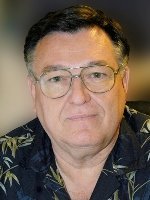
Story by Mike Foley, who sometimes goes by the Hawaiian/Samoan name Mikaele, has been a full-time freelance writer and digital media specialist since 2002. He’s had a long career in marketing communications, PR, journalism and university education before that. He learned to speak fluent Samoan as a Mormon missionary before moving to Laie in 1967 — and still does. He has traveled extensively over the years throughout Polynesia, other Pacific islands and Asia. Foley is mostly retired now, but continues to contribute to various PCC and other media.

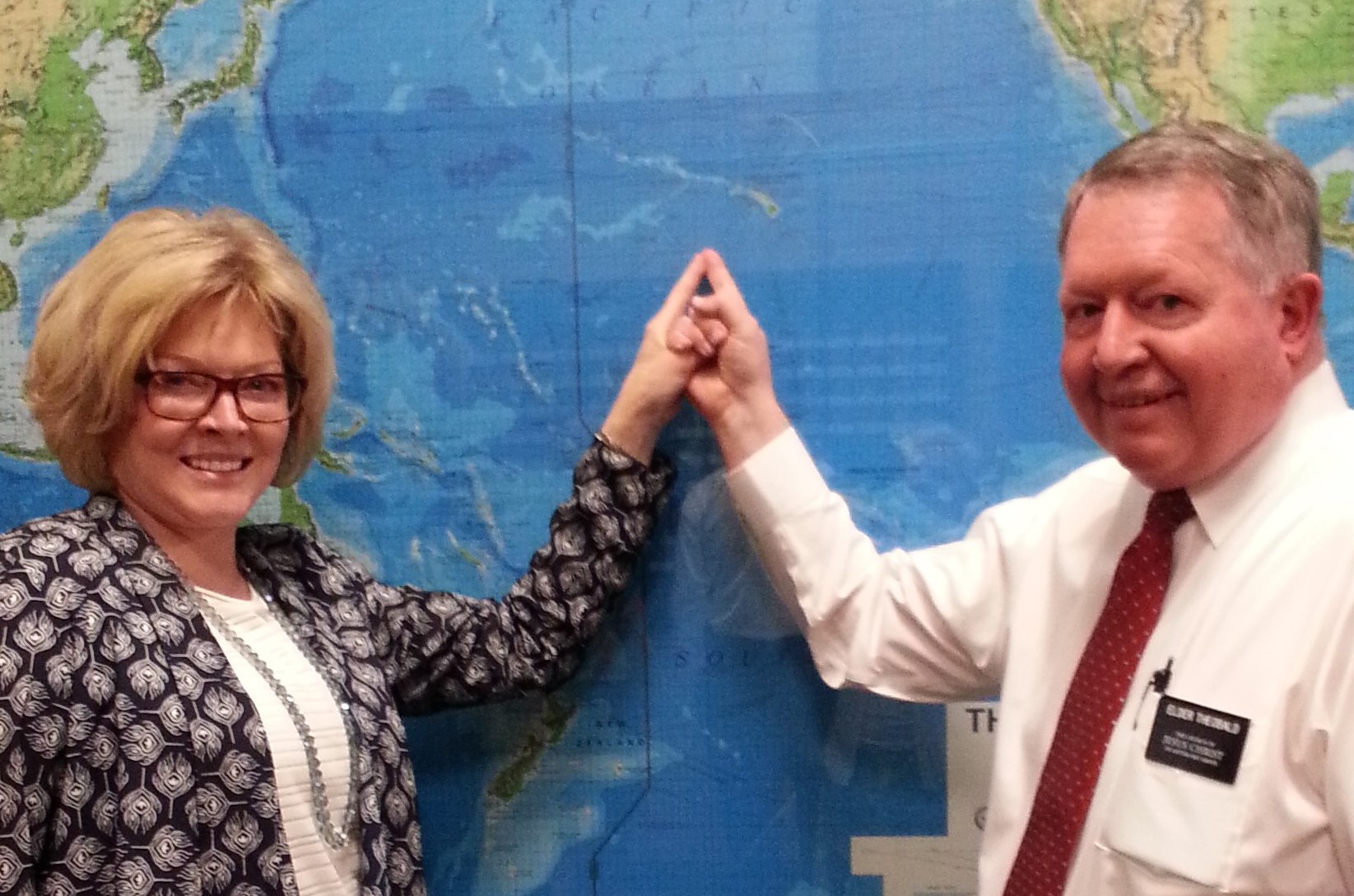
Looking for any pictures of my grandfather who worked on the pcc 1963 his name was LuDean and Ella Maxfield also was present was my aunt Ruthann she was 17
I’m sorry that we do not find any pictures with those names, but have you tried the Polynesian Cultural Center’s 50th Anniversary website? There is a marvelous section made up of photos, videos and memories from our many current and former employees. Go look at: http://pcc50.com/scrapbook-your-memories.html. Best of luck!